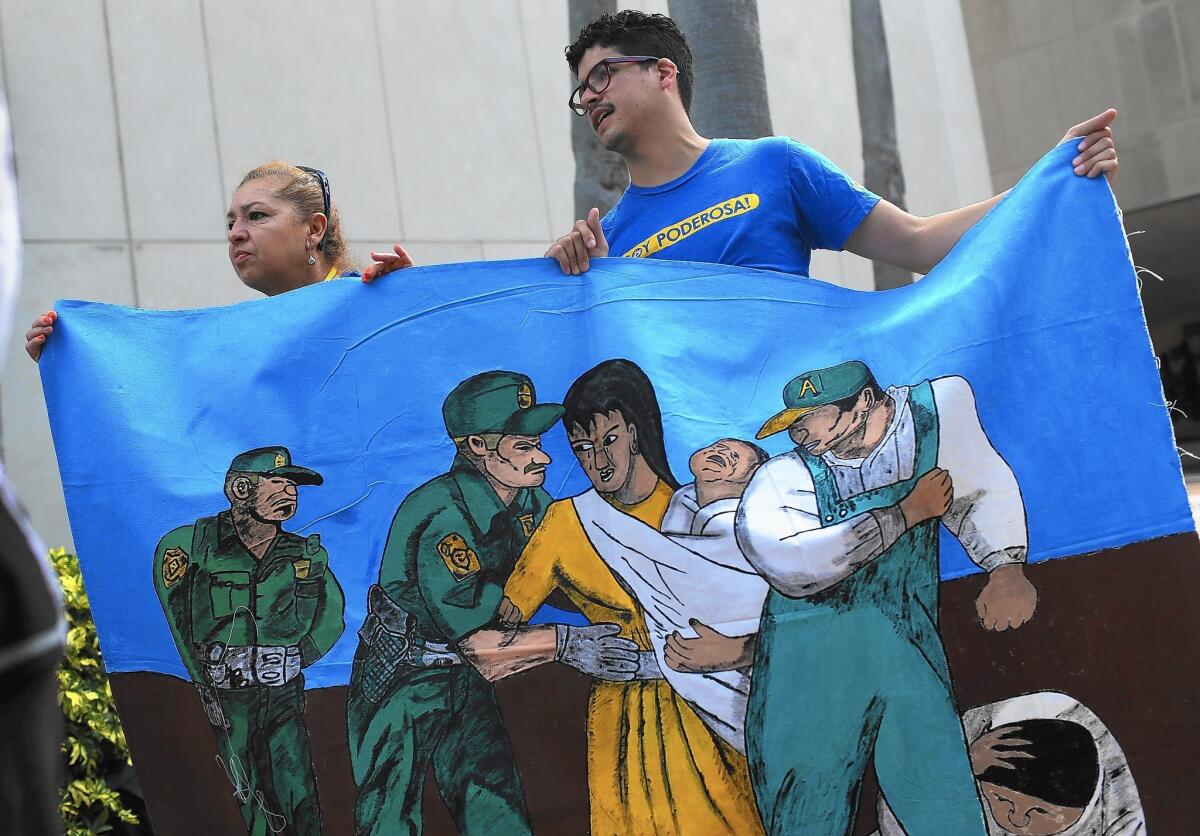In last big test of Obama era, Supreme Court to take up immigration policy

Immigrant families and others gather in Miami for a news conference on the Supreme Court’s upcoming consideration of President Obama’s plan to shield millions of people from deportation.
- Share via
Reporting from WASHINGTON — The Supreme Court’s last great case of the Obama era comes before the justices Monday when the administration’s lawyers defend his plan to offer work permits to as many as 4 million immigrants who have been living here illegally for years.
Once again, lawyers for Republican leaders from Congress and the states will be challenging the actions of the Democratic president. And as with past battles over healthcare and same-sex marriage, Obama administration lawyers will need to win over at least one of the court’s more conservative justices.
If the justices split 4 to 4 — a possibility since the death of Justice Antonin Scalia — the tie vote would keep in place a Texas judge’s order that has blocked President Obama’s deportation relief plan from taking effect.
At issue is whether the president has the power to extend a “temporary reprieve” from the threat of deportation and a work permit to immigrant parents of U.S. citizens or lawful residents. More than one-fourth of those who stand to benefit live in California, according to immigration experts.
The two sides disagree not only on what is the right outcome, but on what the case is about. One side sees a great constitutional clash over the rule of law in a democracy, while the other sees a narrow regulatory dispute.
The Republicans, in written briefs, portray Obama’s order as a profound threat to the constitutional system. If the president can defy Congress and change the law on his own, the nation has abandoned “a bedrock constitutional principle,” they say.
This “would be one of the largest changes in immigration policy in the nation’s history,” say lawyers for Texas and 25 other Republican-led states. They note that the president’s action arose after Congress refused to change the law in line with his wishes, so the order rests on “an unprecedented, sweeping assertion of executive power,” they say.
The House Republicans joined the case on the side of Texas, and if anything, raised the stakes even higher. They described Obama’s immigration order as “the most aggressive of executive power claims” and a threat to “the separation of powers that underpins our very constitutional structure.”
Meanwhile, U.S. Solicitor Gen. Donald Verrilli Jr., the administration’s top lawyer, sought to play down the significance of Obama’s order and defuse the constitutional clash. He said the immigrants who qualify would be offered a temporary relief from deportation that does not “confer any form of legal status.” He cited instances in which Presidents Reagan and George H.W. Bush gave similar relief to large groups of immigrants who were fleeing wars or despotic regimes.
Verrilli spent part of his written brief walking back from the 2014 “guidance” issued by the Department of Homeland Security, which said the applicants who qualified would be “lawfully present” in the United States. That phrase is “purely descriptive and has no operative, legal effect,” he wrote. “‘Lawful presence’ thus might be better called ‘tolerated presence.’ Even with deferred action, the aliens lack lawful status, are actually present in violation of the law, are subject to enforcement at the government’s discretion and gain no defense to removal,” he wrote. Moreover, the president’s order is not a “binding” regulation for U.S. immigration agents, he argued, but merely a “general statement of policy.”
In a separate 2012 program, Obama announced an action that offered relief to young adults who had been brought to this country illegally when they were children. About 700,000 “Dreamers,” as they’re known, have come forward and qualified for work permits under the Deferred Action for Childhood Arrivals. That order went largely unchallenged.
But in 2014, lawyers for Texas and the other states filed suit in Brownsville, near the Mexican border, shortly after Obama announced the larger Deferred Action for Parents of Americans. A federal judge there ruled that the president failed to seek the required “notice and comment” before issuing the new rules, and on that basis, put the plan on hold nationwide.
Last year, the 5th Circuit Court of Appeals upheld that order on a 2-1 vote. Administration lawyers appealed, and in mid-January, the Supreme Court said it would decide the case of United States vs. Texas. The justices said they would also consider whether the president violated his constitutional duty to “take care” to see that the laws are “faithfully executed.”
Scalia had once raised such a question in a separate immigration case, and he was seen as the most likely to support that view. But without the conservative justice on the bench, it is hard to see how the court would hand down a broad constitutional ruling rebuking the president.
Advocates for immigrants see two ways the administration can prevail. The justices might say Texas lacks standing to sue because there is no clear proof the order will hurt the state or impose costs. In the past, Chief Justice John G. Roberts Jr. has been skeptical of granting states the right to sue the federal government over disputed policies.
The justices, led perhaps by Anthony M. Kennedy, could also say the U.S. immigration laws give the chief executive broad power to decide on deportations, including by shielding large groups from being arrested and removed.
david.savage@latimes.com
More to Read
Sign up for Essential California
The most important California stories and recommendations in your inbox every morning.
You may occasionally receive promotional content from the Los Angeles Times.














